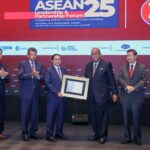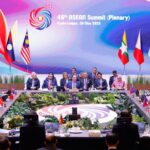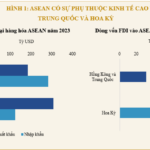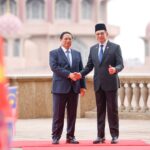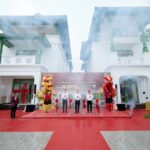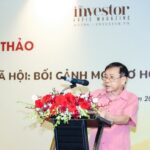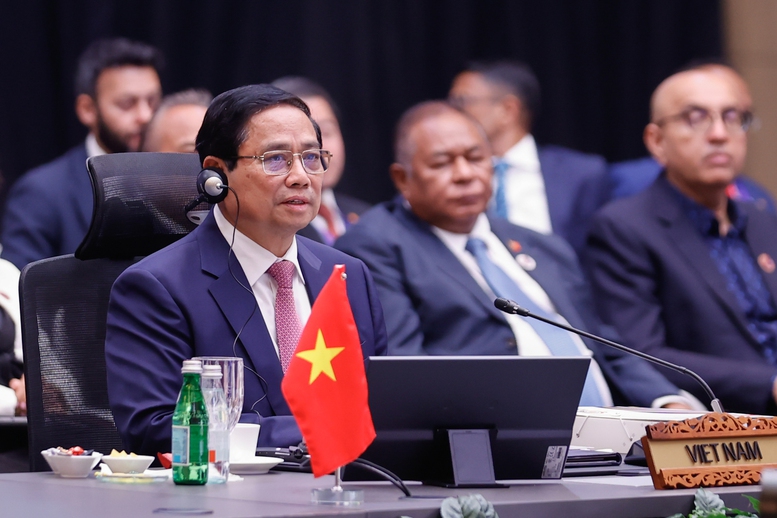
Prime Minister Pham Minh Chinh expressed his belief that with shared trust and a common vision, ASEAN will overcome all challenges and forge ahead strongly. – VGP/Nhat Bac
The meeting was chaired by Malaysian Prime Minister Anwar Ibrahim, the ASEAN Chair for 2025, and attended by leaders of ASEAN member states, as well as Timor-Leste’s Prime Minister Xanana Gusmao and the ASEAN Secretary-General.
At the meeting, the leaders expressed their deep sorrow and condolences on the passing of former President Tran Duc Luong, recognizing his significant contributions to Vietnam’s renewal, development, and regional and international integration.
The leaders endorsed the theme of “Inclusivity and Sustainability,” reflecting ASEAN’s timely need to promote balanced and resilient development, enhance solidarity, and effectively address shared challenges such as climate change, energy security, transnational crime, and natural disasters. They affirmed ASEAN as a bright spot in global growth, with a projected expansion of 4.8% in 2024 and 4.7% in 2025, along with expanding intra-regional cooperation and partnerships. The region’s central role, standing, and prestige continue to be strengthened.
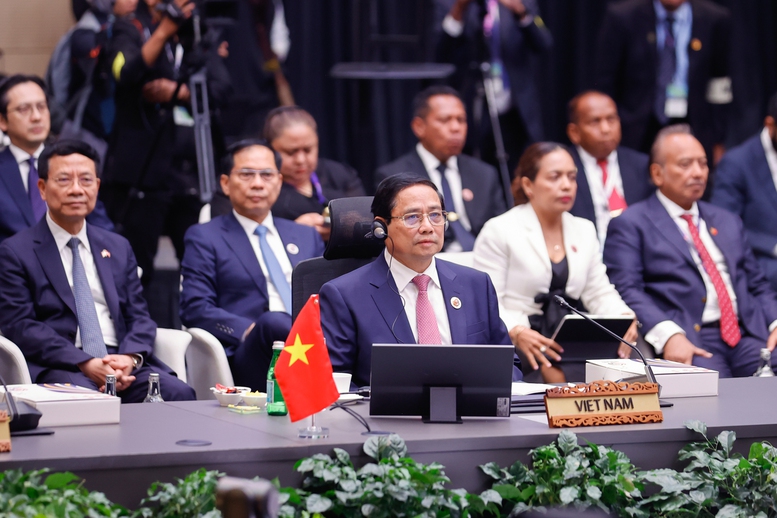
Prime Minister Pham Minh Chinh led the Vietnamese high-level delegation at the ASEAN Summit. – VGP/Nhat Bac
To maintain its achievements amid a dynamic global landscape, ASEAN needs to harness its internal potential, support a rules-based multilateral trading system, effectively utilize existing trade agreements, enhance connectivity, and proactively shape the region’s future through initiatives such as the ASEAN Power Grid and the ASEAN Framework Agreement on Digital Economy.
In this spirit, the ASEAN leaders unanimously adopted the document “ASEAN 2045: Our Future Together,” encompassing the ASEAN Community Vision 2045 and strategies in the political-security, economic, socio-cultural, and connectivity spheres. This document establishes a strategic foundation for ASEAN’s cooperation and integration in the decades ahead.
The leaders emphasized that implementing the 2045 strategies requires not only political declarations but also concrete action plans, adequate resources, effective implementation and monitoring mechanisms, and the engagement of all sectors of society. The ASEAN Community Vision 2045 and the strategies should also be integrated into national development plans to ensure synchronization and consistency.
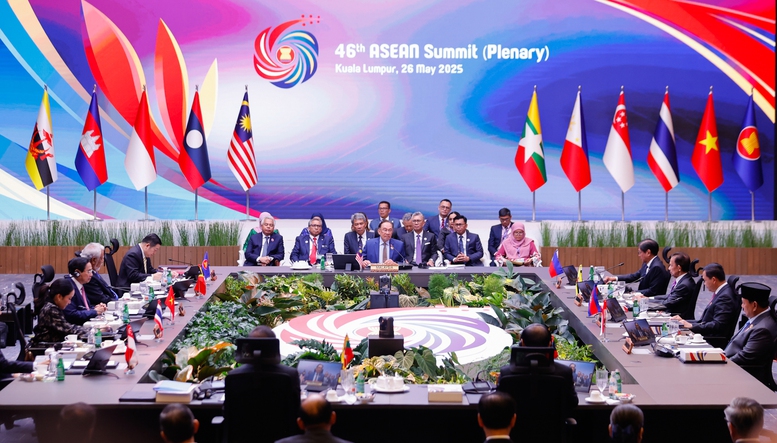
The leaders affirmed ASEAN as a bright spot in global growth, with expanding intra-regional cooperation and partnerships, enhancing its central role and strengthening its standing and prestige. – VGP/Nhat Bac
The ASEAN leaders agreed to admit Timor-Leste as the 11th member of ASEAN at the 47th ASEAN Summit in October 2025 and tasked ministers and senior officials with negotiating the terms of its accession.
In his speech, Prime Minister Pham Minh Chinh expressed gratitude for the heartfelt condolences offered by the leaders on the passing of former President Tran Duc Luong.
Supporting the main theme of this year’s meeting, “Inclusivity and Sustainability,” the Prime Minister expressed confidence that Malaysia, as the ASEAN Chair, would steer the association through difficulties and challenges. He appreciated ASEAN’s timely and coordinated actions in the face of new and unpredictable global developments, marked by increasing political polarization, economic fragmentation, institutional divisions, and development gaps.
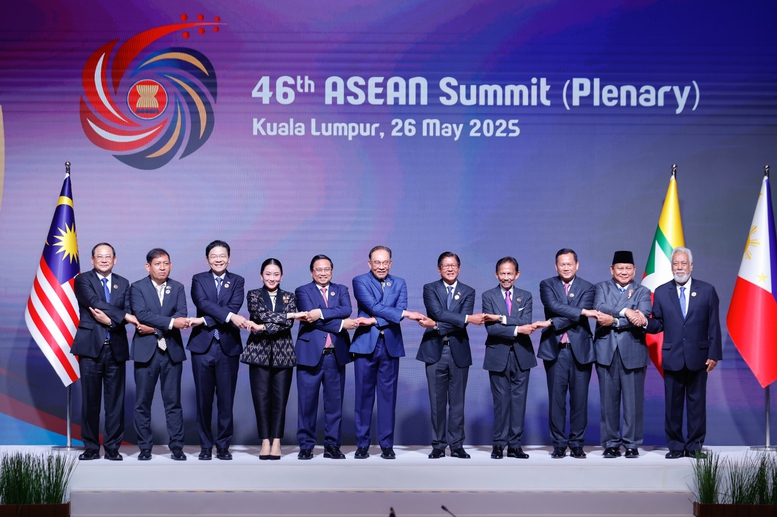
The 46th ASEAN Summit and related summits officially opened on May 26 at the Kuala Lumpur Convention Centre. – VGP/Nhat Bac
Given these challenges, the Prime Minister emphasized the need for ASEAN to strongly promote “5 Mores”: greater solidarity to foster collective strength, greater self-reliance to master our destiny, greater proactiveness to shape the game, greater inclusivity to ensure ASEAN remains a home for all members, and greater sustainability for the future of the next generations. He highly appreciated the adoption of the package of documents, “ASEAN 2045: Our Future Together.” Moving forward, the Prime Minister proposed three key areas of cooperation for ASEAN.
First, ASEAN should reshape its development thinking, prioritizing inclusivity as a foundation, innovation as a driving force, and sustainability as a destination. The Prime Minister suggested that relevant agencies consider incorporating “sustainability” as one of the criteria for evaluating the implementation of the 2045 cooperation strategies, based on three pillars: green economy, inclusive society, and smart governance. He also proposed enhancing resource mobilization from both the public and private sectors to promote digital transformation, science and technology, and innovation, as well as developing region-wide initiatives to inspire ASEAN’s partners to join in these efforts.
Second, ASEAN needs to further enhance its connectivity and expand linkages beyond the region, diversifying products, markets, and supply chains. The Prime Minister welcomed the replication of the ASEAN-Gulf Cooperation Council (GCC) Summit model and the ASEAN-GCC-China Economic Summit with other potential partners such as the Common Market of the South (MERCOSUR) and the Pacific Alliance. He also suggested that ASEAN collectively advocate for free, fair, and inclusive trade principles and uphold multilateralism. The Prime Minister expressed his belief that Timor-Leste’s early accession to ASEAN would significantly contribute to enhancing the association’s self-reliance, inclusivity, and sustainability.
Third, ASEAN should maintain its central role and enhance regional self-reliance. The Prime Minister emphasized that ASEAN’s success hinges on safeguarding strategic autonomy and independence in decision-making. ASEAN must reaffirm its centrality not only in name but also in action, preserving strategic autonomy, fostering internal consensus, and enhancing proactive adaptability to external changes. In light of the increase in transnational crimes, the Prime Minister announced Vietnam’s proposal to develop an ASEAN Declaration on Enhancing Cooperation in Fugitive Apprehension, seeking support from other countries.
The Prime Minister expressed his conviction that with shared trust and a common vision, ASEAN will overcome all challenges and forge ahead strongly. Vietnam is committed to being a responsible, proactive, and active member, ready to join hands in building a Community that is “more united, resilient, proactive, inclusive, and sustainable” for today and future generations.
Which ASEAN Country Fares Best Against US Tariffs?
The negotiations on tariffs with the US are ongoing, and Asian countries, particularly the ASEAN region, are in a hurry to conclude them. As a highly trade-dependent region, ASEAN has much at stake when it comes to US tariff policies. However, resilience lies not in the trade deficit figures but in the intrinsic structure and strategic response capabilities of the region.
Unlocking Trade Potential: Vietnam and Malaysia Aim for $20 Billion Trade Target, Embracing Green Initiatives and Halal Industry
On May 25, during a meeting in Kuala Lumpur, Prime Minister Pham Minh Chinh and his Malaysian counterpart agreed to boost bilateral trade to 20 billion USD by 2030. They also affirmed their commitment to enhancing collaboration in green economy, Halal industry, and defense and security.



























